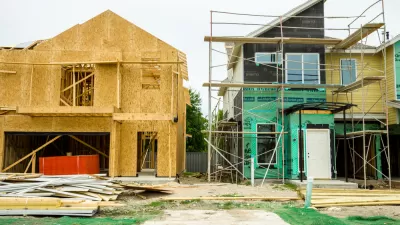Developers planning to build above the city’s current height limit will have to go back to the drawing board.

Miami Beach residents voted to stop the development of two high-rise towers in three different referendums last week, reports Deborah Acosta for the Wall Street Journal.
The project, slated for construction on the site of the now-shuttered Deauville Hotel at a height of 375 feet, would have required voter approval to be exempted from current zoning regulations, which limit building height to 200 feet. “Daniel Ciraldo, executive director of Miami Design Preservation League, said the voters signaled they aren’t ready to approve projects that could significantly change the character of Miami Beach, which is famous for its art deco architecture and lower-rise buildings.”
According to Acosta, “Even though the project is on hold, the hotel, which had been run into disrepair by the family who bought it in 2004 for $4 million, was imploded on Sunday. The nearly 4-acre site will now sit empty until new plans for the site are approved.”
Acosta points out that other developers have had more success in getting projects approved in Miami Beach. “New York developer Michael Shvo, for example, secured approval last week from the Miami Beach Historic Preservation Board for one of his office developments,” with three total projects in the works in the city.
FULL STORY: Major Miami Beach Real-Estate Projects Nixed by Voters

Planetizen Federal Action Tracker
A weekly monitor of how Trump’s orders and actions are impacting planners and planning in America.

Map: Where Senate Republicans Want to Sell Your Public Lands
For public land advocates, the Senate Republicans’ proposal to sell millions of acres of public land in the West is “the biggest fight of their careers.”

Restaurant Patios Were a Pandemic Win — Why Were They so Hard to Keep?
Social distancing requirements and changes in travel patterns prompted cities to pilot new uses for street and sidewalk space. Then it got complicated.

California Homeless Arrests, Citations Spike After Ruling
An investigation reveals that anti-homeless actions increased up to 500% after Grants Pass v. Johnson — even in cities claiming no policy change.

Albuquerque Route 66 Motels Become Affordable Housing
A $4 million city fund is incentivizing developers to breathe new life into derelict midcentury motels.

DC Area County Eliminates Bus Fares
Montgomery County joins a growing trend of making transit free.
Urban Design for Planners 1: Software Tools
This six-course series explores essential urban design concepts using open source software and equips planners with the tools they need to participate fully in the urban design process.
Planning for Universal Design
Learn the tools for implementing Universal Design in planning regulations.
Heyer Gruel & Associates PA
JM Goldson LLC
Custer County Colorado
City of Camden Redevelopment Agency
City of Astoria
Transportation Research & Education Center (TREC) at Portland State University
Camden Redevelopment Agency
City of Claremont
Municipality of Princeton (NJ)





























